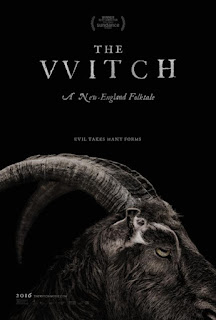Movies: The Witch
It is scary to think about America's roots...how much of it is based in hysterical religious fanaticism. To read an American history textbook is to read a horror story itself: genocide, slavery, hangings, conquering, brute force...all alongside progression, bravery, a thirst for freedom. America is a land of bifurcated people: lust for money, power, and sex, but held fast by a deep-seated history of Christianity that demands we reject pleasure and desire and sin. We didn't need Orwell's 1984 to teach us the concept of "double-think" because we live it every day, and always have.
We're a fucked up bunch, y'all. Which makes Robert Eggers' freshman film The Witch (subtitled A New England Folktale) such a keen horror story that looks into the heart of early America's religious fundamentalism and paranoia.
The film takes place in 1630, 60 years before the events at Salem, Massachusetts. A family of puritans is cast out from their small plantation village and seeks a new home near the foreboding woods. William, the patriarch of the family, is convinced they'll have a better life away from what he considers to be the "false Christians" at the plantation. His wife, Katherine, is unconvinced. They have five children: eldest daughter Thomasin (played by wide-eyed newcomer Anya Taylor-Joy), son Caleb, younger twins Mercy and Jonas, and baby Samuel. When Samuel disappears one day during a game of peek-a-boo with Thomasin, the family is torn apart by grief...and an increasing sense of terror about the woods around them.
The Witch is not a typical horror movie. There aren't many jump scares or gory special effects. The film is dedicated to historical accuracy, not just in clothing and scenery, but in dialogue, and it's difficult to understand half of what the characters are saying. They're speaking English as it was spoke 380 years ago, with "thines" and "thous" aplenty, which makes them sound at times as if they're speaking a different language entirely.
While the film makes good on its promise of supernatural hijinks, the real horror is the paranoia the family falls into after Samuel the baby is gone and Caleb falls ill after being lost in the woods overnight. Mercy and Jonas accuse Thomasin of being a witch, and instead of thinking that the 7 year old twins are clearly making believe, William and Katherine believe them instantly...forcing Thomasin to defend herself and even accuse Mercy of witchcraft. To me, the ease with which people took the accusations of children seriously was the most chilling part of the film, especially knowing that this is precisely what happened at Salem decades later, leading to the deaths of innocent people.
But another aspect of The Witch is its feminist subtext. Being a Puritan must have been hellish. In addition to the struggle of carving out a life in the wilderness, the Puritans lived lives of guilt and fear--fear of an angry God and of eternal damnation. Being a Puritan woman was especially difficult, given that women were considered by nature evil during this time (a far cry from Victorian America's view of women as pure, gentle "angels of the home"). Thomasin faces the brunt of religiously-based misogyny in this film and is a symbolic stand-in for both the girls who accused others of being witches in Salem and the accused themselves.
Did witchery really happen at Salem, or throughout Europe during the witch hunts? Did women truly dance naked with the Devil? I personally don't believe so, but if you were a woman during these eras--repressed to the point of insanity, wouldn't you want to act out by seizing on the floor, by screaming and accusing others, by taking your clothes off and running through the woods? I know I would. When acting insane is the only escape, then insane we act. Part of the pleasure of doing things you were raised not to do--have sex, drink, vote for Green Party candidates--is the ability to throw "virtue" back in the face of whoever taught it to you. And the girls of Salem did exactly that.
The Witch is both a fictional, supernatural horror film and a metaphor for America itself: a land and a people that pride independence, perseverance, wanderlust, and hard work...but also a deep-seated fear of pleasure, of sex, of women, and a need to control all these things, even if it means burning them at the stake.
Grade: B-

No comments:
Post a Comment